Stand up for the facts!
Our only agenda is to publish the truth so you can be an informed participant in democracy.
We need your help.
I would like to contribute

President Barack Obama speaks and Health Secretary Kathleen Sebelius looks on at Thursday's bipartisan health care summit.
UPDATED: This report was last updated on Tuesday, March 11, 2010 at 4:28 p.m.
Democrats and Republicans talked about health care reform on Thursday - and talked, and talked, and talked. It's not clear that anyone changed his or her mind, but everyone got to throw out some favorite health care facts and figures.
They met as part of a bipartisan meeting on health care reform, hosted by President Barack Obama. The meeting started at 10 a.m. and lasted all day, even going over its scheduled time by about an hour.
• House Speaker Nancy Pelosi said health care reform could spur employment. "It's about jobs," she said. "In its life [health care reform] will create 4 million jobs, 400,000 jobs almost immediately." Pelosi was basing her remarks on a study that assumed health care reform would lower costs for employers and allow them to increase hiring. We found that Pelosi selected the highest numbers from a range of estimates, so we rated her statement Half True.
• President Obama jousted with Republicans over whether his plan would lower costs for families. Under his plan, Obama said, "The costs for families (in the individual market) for the same type of coverage that they're currently receiving would go down 14 percent to 20 percent." We found that new regulations will require insurers to offer more comprehensive coverage, which will cost more if you currently have a minimal plan. Some taxpayers will get tax credits to reduce their out-of-pocket costs. We rated Obama's statement Half True.
• Republican Rep. Charles Boustany of Louisiana said that the Republican plan was less expensive than the Democratic plan. (Part of the reason for this is that the plan doesn't cover as many people.) Boustany said that the nonpartisan Congressional Budget Office found that the House Republican health care plan would lower premiums by "up to about 10 percent" and, for purchasers in the individual market, "those cost savings could even be higher." We rated that Mostly True.
• Democratic Senate leader Harry Reid said it wouldn't be a big deal if the Democrats pass health care reform in the Senate using a parliamentary maneuver known as reconciliation, which requires only 50 votes. "Since 1981, reconciliation has been used 21 times," Reid said. "Most of it's been used by Republicans." We examined the reconciliation votes since 1981 in detail and found that Reid is correct about how often Republicans used reconciliation. We rated his statement True.
• Republican Sen. Lamar Alexander said that the Democratic health plan "dumps 15 to 18 million low-income Americans into a Medicaid program that none of us want to be a part of because 50 percent of doctors won't see new patients." We found he was correct about the additional people who would enter the program, but off about the percentage of doctors who won't see new patients. We rated his claim Half True.
We also found that many of the talking points referred to statements we've already checked.
• Republicans talked about public opposition to health care reform plans. We checked Republican Sen. Jon Kyl's statement, "One of the most recent polls said 75 percent of the American people have said either don't do anything or start over (on health care reform)." We rated that Mostly True.
• Republican Sen. John McCain discussed the "cornhusker kickback," a special deal for Nebraska in the Senate bill won by Democratic Sen. Ben Nelson. We explained that deal in our report on Nelson's statement, that a Medicaid provision added to the Senate health care reform bill "is not a special deal for Nebraska." We rated Nelson's statement False.
• A major topic was fraud in Medicare, the government-run health insurance program for seniors. Our previous reporting indicates that authorities have estimates on Medicare fraud, but no one can say with certainty how much money is wrongfully diverted from the program.
• Another point of debate concerned the Medicare Advantage program, which pays private insurance companies to treat Medicare beneficiaries. It was conceived as a cost containment measure on the theory that competition between private plans would drive down costs. In fact, the plans have consistently cost the government more per beneficiary than traditional fee-for-service Medicare costs. We also looked into whether the Medicare Advantage plans provide better care, and found the results inconclusive.
For more, check out the more than 100 fact-checks we've conducted on health care reform. We've also been monitoring more than 100 health care campaign promises Obama made during 2008. You can comment on our fact-checks with other readers on our Facebook page. Finally, if you heard a fact you want us to examine, e-mail us at [email protected]
Our Sources
The White House, A Bipartisan Meeting on Health Reform, accessed Feb. 24, 2010
The White House, The President's Proposal, accessed Feb. 24, 2010
GOP.gov, Health care, accessed Feb. 24, 2010
GOP.gov, GOP Solutions for America, accessed Feb. 24, 2010














































